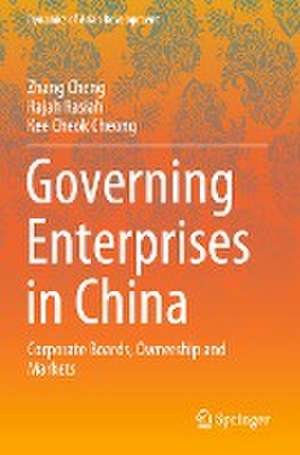Governing Enterprises in China: Corporate Boards, Ownership and Markets: Dynamics of Asian Development
Autor Zhang Cheng, Rajah Rasiah, Kee Cheok Cheongen Limba Engleză Paperback – 26 iun 2022
| Toate formatele și edițiile | Preț | Express |
|---|---|---|
| Paperback (1) | 776.09 lei 6-8 săpt. | |
| Springer Nature Singapore – 26 iun 2022 | 776.09 lei 6-8 săpt. | |
| Hardback (1) | 782.42 lei 3-5 săpt. | |
| Springer Nature Singapore – 25 iun 2021 | 782.42 lei 3-5 săpt. |
Preț: 776.09 lei
Preț vechi: 946.45 lei
-18% Nou
Puncte Express: 1164
Preț estimativ în valută:
148.52€ • 154.86$ • 123.44£
148.52€ • 154.86$ • 123.44£
Carte tipărită la comandă
Livrare economică 21 martie-04 aprilie
Preluare comenzi: 021 569.72.76
Specificații
ISBN-13: 9789811631184
ISBN-10: 9811631182
Ilustrații: XX, 165 p. 13 illus.
Dimensiuni: 155 x 235 mm
Greutate: 0.27 kg
Ediția:1st ed. 2021
Editura: Springer Nature Singapore
Colecția Springer
Seria Dynamics of Asian Development
Locul publicării:Singapore, Singapore
ISBN-10: 9811631182
Ilustrații: XX, 165 p. 13 illus.
Dimensiuni: 155 x 235 mm
Greutate: 0.27 kg
Ediția:1st ed. 2021
Editura: Springer Nature Singapore
Colecția Springer
Seria Dynamics of Asian Development
Locul publicării:Singapore, Singapore
Cuprins
Introduction.- Theoretical Considerations.- Methodology and Data.- Determinants of Board Composition.- Corporate Governance Mechanisms and Firm Performance.- Corporate Governance Mechanisms and Firm-Risk Taking.- Conclusions.
Notă biografică
Zhang Cheng, Ph.D., is Professor at School of Accounting, Nanjing University of Finance and Economics.
Rajah Rasiah, Ph.D., is Distinguished Professor of Economics at the Asia-Europe Institute, University of Malaya. His research interests include technology and international development, foreign investment, human capital, public health, and environment. He holds external positions at UNU-MERIT, Oxford University, Cambridge University, and Universiti Tenaga Nasional. He is the 2014 recipient of the Celso Furtado Prize awarded by the World Academy of Sciences for advancing the frontiers of social science thought.
Cheong Kee Cheok is Senior Advisor at the Asia-Europe Institute, University of Malaya. His research interests include economic development, transition economies, employment and poverty, and international economic relations. Some of his selected publications include Revisiting Malaysia's Population-Development Nexus: The Past In Its Future (UMPress) and Government-Linked Companies And Sustainable, Equitable Development (Routledge).
Rajah Rasiah, Ph.D., is Distinguished Professor of Economics at the Asia-Europe Institute, University of Malaya. His research interests include technology and international development, foreign investment, human capital, public health, and environment. He holds external positions at UNU-MERIT, Oxford University, Cambridge University, and Universiti Tenaga Nasional. He is the 2014 recipient of the Celso Furtado Prize awarded by the World Academy of Sciences for advancing the frontiers of social science thought.
Cheong Kee Cheok is Senior Advisor at the Asia-Europe Institute, University of Malaya. His research interests include economic development, transition economies, employment and poverty, and international economic relations. Some of his selected publications include Revisiting Malaysia's Population-Development Nexus: The Past In Its Future (UMPress) and Government-Linked Companies And Sustainable, Equitable Development (Routledge).
Textul de pe ultima copertă
This book examines the nature of the marketization of corporate boards following the introduction of the split share reform, corporate board and shareholder relations, corporate performance, and risk-taking conduct in China. The chapters cover topics such as determinants of corporate board size and independence, corporate risk-taking conduct under different controlling shareholder types. The book deepens our understanding of corporate governance mechanisms as most previous studies have limited their findings using mainstream perspectives grounded on neoclassical theory. It outlines that China’s corporate board composition is determined by the board’s scope of operation, monitoring, bargaining power, and other governance mechanisms and regulations. It also offers a comparison between China’s experience with other economies in general and other transition economies in particular. As such, the book represents an essential overview ofthe current concerns regarding corporate governance in China. It is of great interest to legal researchers, policymakers, and legal practitioners working with business investments in China.
Caracteristici
Deals comprehensively with corporate board constitution before, during, and after the split share reforms Provides the most inclusive evidence on China on how the interests of owners and people’s welfare are balanced Offers a unique contribution to scholarship that all students, experts, and officials on corporate governance must read










